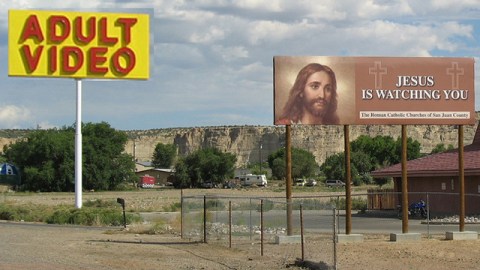Religious People Buy Less Porn on Sundays

I wonder how many Americans were sitting in church yesterday thinking about porn. After all, about one in three internet users in the U.S. visit a porn site every month—and of those who do, the average number of visits is about two per week. According to the National Election survey (2004), 68% of Americans believe that the Bible is the literal word of God with about 40% reporting regular church attendance. So, are Americans polarized into two groups, churchgoers and porn watchers? Or do churchgoers also watch online porn?
A paper has recently been published on this topic using the number of paid subscriptions to online porn sites by zip code to see if neighborhoods with higher levels of religious service attendance buy more or less online porn then those with lower levels of church attendance. Even when the author controls for income (more porn in higher-income neighborhoods), education (more porn for those neighborhoods with high levels of college education but less porn where more have graduate degrees), population density (city dwellers watch more porn then those in other areas), and marriage rates (people watch less porn where marriage rates are high), he finds no difference between the number of internet porn subscriptions in neighborhoods with high religious attendance and those where attendance is low. The only difference is that in the neighborhoods with high religious attendance people are less likely to subscribe to an online porn site on a Sunday. In fact, a 1% increase in the share of people in a neighborhood regularly attending a religious service is associated with a decrease by 0.1% of online porn subscriptions started on a Sunday. Overall though, the same number of subscriptions is purchased over the course of the week.
The demand for a good (or service) is a function of both the substitutes and complements that are available for that good. Two goods are complements if the demand for one good increases when the price of the other good falls—think condoms and lubricants. Two goods are substitutes if the demand for one good increases when the price of the other good increases—perhaps condoms and alcohol. The students in my sex and love class have a good time trying to list possible complements to porn. There are plenty of substitutes to online porn, thoughl and, before we jump to the conclusion that churchgoers consume as much porn as non-churchgoers, we have to consider the possibility that the price of substitutes to porn is not the same across all neighborhoods.
Say, for example, I can choose between watching online porn and buying an erotic magazine: those two goods are substitutes. If I live in a neighborhood with low religiosity, maybe it is easy for me to walk into the local corner store and pick up a copy of Playgirl magazine. The cost of buying the magazine is low because I don’t have to travel outside of my neighborhood to buy it. Plus maybe my neighbors don’t care what I buy and so there is less of a cost in terms of social awkwardness. In a neighborhood where religiosity is high, it might be much more costly to buy substitutes to online porn, either because it can’t be purchased locally or because erotic purchases are stigmatized. Within this economic framework it isn’t that surprising that there is no difference between online porn purchases in religious and non-religious areas. In fact, if total consumption of porn was the same between these neighborhoods, one might expect online porn subscriptions would be higher in the religious areas since the cost of substitutes (for example lap-dancing clubs, video rentals and casual sex) is likely to be higher as well.
I have to admit, the reduction in the number of subscriptions on Sundays doesn’t do much to make me think that it is the minority of “heathens,” who can’t find their porn elsewhere, who are buying all the subscriptions in these high religious-attendance neighborhoods. I am surprised though that church goers don’t go for the really cheap substitute to online-porn subscription–free online porn. I guess free porn and subscription-only porn are less-than-perfect substitutes. Maybe that is something I should investigate further.
Edelman Benjamin (2009). “Red Light States: Who Buys Online Adult Entertainment?” Journal of Economic Perspectives, Vol. 23 (1).





